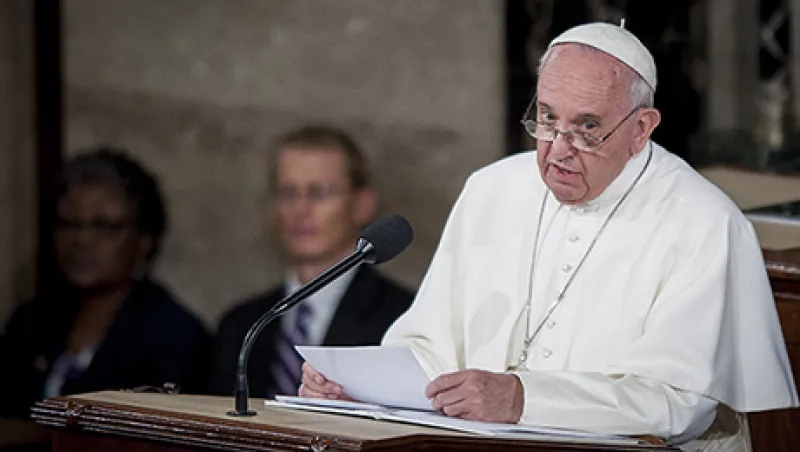Speaking at the United Nations this morning, Pope Francis addressed the urgent need to tackle the challenges of global warming. Since he issued his encyclical “On Care for Our Common Home” in May, the Pope has been vocal in his insistence that “the urgent challenge to protect our common home includes a concern to bring the whole human family together to seek a sustainable and integral development.”
With his rallying cry, the Bishop of Rome is backing up the scores of scientists, activists and politicians who have been calling for a global accord to fight this threat at the U.N. Climate Change Conference taking place in Paris, November 30 to December 11. The Pope has even gone so far as to call on investors to divest from fossil fuel companies.
The Pope’s statements have confounded climate deniers, including Catholics on the political right, like U.S. Republican presidential candidate and former Pennsylvania senator Rick Santorum. But not all Catholics are disappointed by the Pope’s leadership on this issue.
As CEO and CFO of the Franciscan Sisters of Mary in Bridgeton, Missouri, John O’Shaughnessy is delighted that the head of his church is taking a stand. The $100 million Franciscan Sisters of Mary congregation has not only divested its fossil fuel holdings; it has also committed 10 percent of its capital to impact investments with a social and environmental benefit. For O’Shaughnessy, such a strategy shows how “we can actually be aligning our investing in ways that are consistent with supporting our mission.”
The Sisters are not alone. Catholic institutions including churches, colleges and hospitals are increasingly concerned about the threat of climate risk to the planet, communities and their investments — and they are taking action. According to a recent paper published by Washington-based Arabella Advisors, “57 faith-based institutions representing $1.4 billion assets had divested of fossil fuels” as of September 2014.
Catholic institutions are among the investors representing $2.6 trillion of assets that have taken the divest-invest pledge — divesting from the 200 largest coal, gas and oil companies and investing in the green economy — as announced by the action campaign Divest-Invest on Tuesday. Others that have committed to the pledge include the Children’s Investment Fund Foundation, the not-for-profit affiliated with London-based The Children’s Investment Fund Management U.K. hedge fund firm founded by Christopher Hohn.
Other Catholic investors named in the Arabella report include the University of Dayton in Dayton, Ohio, and the Sisters of St. Francis of Philadelphia. In November the University of Dayton will host a conference for Catholic institutions, “Acting on Pope Francis’ Call: Divestment and Investment in Care for Our Common Home.” Like the Franciscan Sisters of Mary, Dayton has divested its endowment from coal and other fossil fuels. The school announced its decision to divest its $690 million endowment in June 2014, becoming the first U.S. Catholic university to do so. O’Shaughnessy for one is effusive in his praise for Dayton board member George Hanley, founder and president of Level 5 Trading Group, a Chicago-based electronic trading firm, as a thought leader on the issue of mission alignment at faith-based institutions.
“Faith investors have a robust history of being engaged with their assets, from screening their holdings and engaging with public companies, to being early investors in community development and microfinance,” says John Goldstein, co-founder of San Francisco–based impact investing advisory firm Imprint Capital Advisors, which was acquired by Goldman Sachs & Co. in August. “Recent years have seen a next step toward the growing impact investment movement and a more proactive embrace of environmental investments.” Imprint’s clients include the Franciscan Sisters of Mary and other faith-based institutions.
O’Shaughnessy says that, despite the call to action from Pope Francis, much of the impetus to combat climate change and climate injustice — a warming atmosphere disproportionately impacts the poor and disenfranchised — has been a grass roots effort. “The pressure at Catholic congregations comes from the members,” he says. To date, O’Shaughnessy adds, most of the Catholic leaders in the U.S. have not taken up the problem of the environment largely being they are preoccupied with other, often more right-leaning, issues such as same-sex marriage. The Pope’s call to action today at the U.N. could change that, as U.S. bishops feel pressure from above to address climate change.
Visit Imogen Rose-Smith’s blog and follow her on Twitter at @imogennyc.





